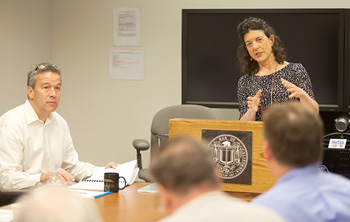Bar course doles out advice on tracking client money
By Amy Yarbrough
Staff Writer
Standing in front of a class of lawyers and State Bar
prosecutors last month, Senior Trial Counsel Robin Brune shared one of her war
stories.
 |
Senior Trial Counsel Rob Henderson observes as Senior Trial Counsel Robin Brune instructs a class on client trust accounting.
Photo by S. Todd Rogers |
It involved an attorney who found himself the subject of a
State Bar complaint filed by a medical lien holder. After rifling through a
folder in a cabinet, the attorney found a two- or three-year-old check he’d
written to pay the lienholder – but never sent.
Brune’s parable, told to lawyers attending the State Bar’s
Client Trust Accounting School on March 14 in San Francisco, highlighted the
perils of not double-checking your client ledger against your other records.
“If he had done that monthly reconciliation, he would have
noticed that problem,” she said.
Designed to keep attorneys out of disciplinary trouble,
Client Trust Account School is held four times yearly in San Francisco and six
times in Los Angeles and is mandatory for attorneys disciplined for client
trust account violations. In 2013, 80 disciplined attorneys took the course. In
2012 and 2011, those numbers were 144 and 111 respectively.
But volunteers also enroll because they want a refresher or to
be proactive, says Brune, who has been teaching the course for at least 10
years.
“Some attorneys send their office managers,” said Brune,
whose recent class included several State Bar prosecutors training to teach the
program. “Some of them are accountants, and they want to promote their services
to attorneys.”
Client trust accounts have come under closer scrutiny by the
State Bar Board of Trustees recently. The board has directed State Bar staff to
explore the feasibility of random auditing to make sure lawyers are properly
handling client money.
Although there is no plan yet, the audit would most likely
come in the form of a questionnaire, State Bar CEO Joseph Dunn said. Lawyers and firms could
be asked to provide details about their accounts which would reveal any red
flags in the handling of client money.
Brune’s three-hour class last month began with a discussion
of California Rule of Professional Conduct 4-100, which sets minimum standards attorneys
must follow to keep track of money they are holding for clients. Brune then drew
a rough spreadsheet on a large sheet of paper, walking participants through the
process of creating and maintaining individual client ledgers, which must be
used to track every receipt and payment for a client. For every receipt,
attorneys must list the date, amount and source of payment. For each payment,
the date, amount, the payee and purpose of the payment must be listed.
 |
An attorney participating in the State Bar’s Client Trust Accounting School reviews course material.
Photo by S. Todd Rogers
|
Brune also demonstrated how to maintain an account journal, used
to track money coming and going from a client trust account. Each must include
the dates, sources of deposit, payees, check numbers and deposits and show a
running balance.
To help catch mistakes that could lead to disciplinary
problems, attorneys must compare their individual client ledgers with bank
statements and their trust account journals every 30 days.
“What you want is transparency and accountability,” Brune
said. To that end, it is always a bad idea to use money belonging to one client
to pay another.
“If you use one client’s money to pay another, even though
it doesn’t go into your own pocket, you’ve mismanaged it … that is
misappropriation,” she said.
According to Brune, only attorneys who hold money on a
client’s behalf are required to have client trust accounts. All funds held or
received for the benefit of a client must be kept in a client trust account,
along with any advanced costs or expenses, money in which your client and a
third party have a joint interest and money that doesn’t belong to your client,
but that you’re holding as part of carrying out your representation of that
client. Disputed funds must also be kept in a client trust account until the
dispute is settled.
Attorneys’ personal or office money should never be
deposited in a client trust account, except for nominal amounts such as $100 to
cover bank charges.
Brune also discourages using ATMs for client trust accounts
and recommends the attorney be the sole signatory on the account.
“ ‘My secretary did it’ isn’t really a viable defense in
State Bar proceedings,” she said.
The State Bar publishes a handbook on client trust accounting. Or, attorneys may call the Ethics Hotline with questions. The number is toll-free for attorneys in California, 800-238-4427.
In the end, one of the best bits of advice is to keep thorough
and up-to-date records, Brune said.
“Your bookkeeping is really your protection, both for your
client and yourself.”